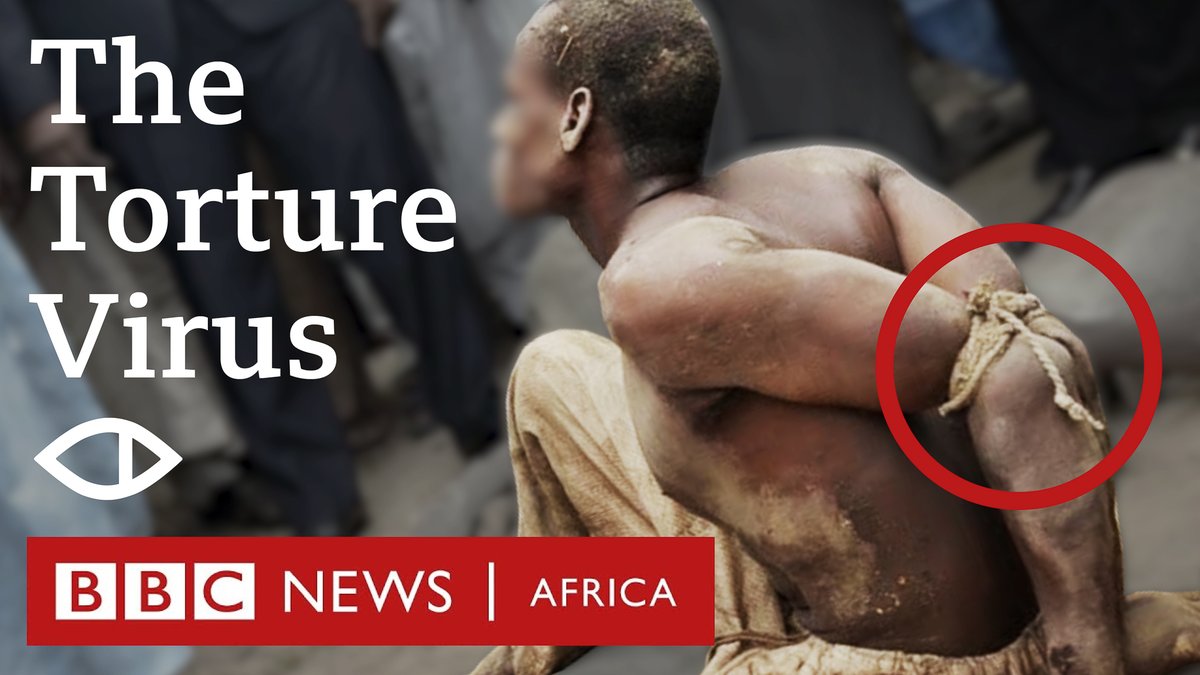And then, in 2019, we found a serving police officer who gave us a disturbing eyewitness account of what happens inside one SARS station.
For his own safety, we’ve hidden his identity.
 https://abs.twimg.com/emoji/v2/... draggable="false" alt="🔊" title="Lautsprecher mit drei Schallwellen" aria-label="Emoji: Lautsprecher mit drei Schallwellen"> [sound on]
https://abs.twimg.com/emoji/v2/... draggable="false" alt="🔊" title="Lautsprecher mit drei Schallwellen" aria-label="Emoji: Lautsprecher mit drei Schallwellen"> [sound on]
For his own safety, we’ve hidden his identity.
This investigation started by looking at a particular form of torture.
But the focus on #tabay has raised a more fundamental question:
Why, when we’ve found so many examples of torture being used, can we find so few cases in which the perpetrators were held to account?
But the focus on #tabay has raised a more fundamental question:
Why, when we’ve found so many examples of torture being used, can we find so few cases in which the perpetrators were held to account?
One explanation is that torture has its defenders.
Some argue that these methods are a necessary part of the fight against the terrorists and bandits who plague whole regions of Nigeria.
Some argue that these methods are a necessary part of the fight against the terrorists and bandits who plague whole regions of Nigeria.
But #tabay is not just used against terrorists.
In June 2019, these boys were tortured by members of a government-backed vigilante group, the Civilian Joint Task Force (CJTF), in Maiduguri.
One boy has fainted from the pain. The other is begging to be shot.
 https://abs.twimg.com/emoji/v2/... draggable="false" alt="🔊" title="Lautsprecher mit drei Schallwellen" aria-label="Emoji: Lautsprecher mit drei Schallwellen">[sound on]
https://abs.twimg.com/emoji/v2/... draggable="false" alt="🔊" title="Lautsprecher mit drei Schallwellen" aria-label="Emoji: Lautsprecher mit drei Schallwellen">[sound on]
In June 2019, these boys were tortured by members of a government-backed vigilante group, the Civilian Joint Task Force (CJTF), in Maiduguri.
One boy has fainted from the pain. The other is begging to be shot.
The boys were accused not of terrorism, but of stealing $80.
We found them at their home in Maiduguri, and with the permission of the boys and their guardian, asked them about their ordeal.
 https://abs.twimg.com/emoji/v2/... draggable="false" alt="🔊" title="Lautsprecher mit drei Schallwellen" aria-label="Emoji: Lautsprecher mit drei Schallwellen">[sound on]
https://abs.twimg.com/emoji/v2/... draggable="false" alt="🔊" title="Lautsprecher mit drei Schallwellen" aria-label="Emoji: Lautsprecher mit drei Schallwellen">[sound on]
We found them at their home in Maiduguri, and with the permission of the boys and their guardian, asked them about their ordeal.
Determined to get justice, a relative of these boys posted the torture video to Facebook.
The next day, the CJTF issued a public apology to this family.
The CJTF has since told the BBC it forbids its members from committing any form of crime.
The next day, the CJTF issued a public apology to this family.
The CJTF has since told the BBC it forbids its members from committing any form of crime.
The CJTF said that this man, Umara Bukar Karumi, was arrested and prosecuted by the police, along with four others.
But even in this case, there are questions about accountability.
Had these men been charged under the anti-torture act, they would have faced up to 25 years in jail.
Instead, they received a lesser charge and were sentenced to just 3 months.
Had these men been charged under the anti-torture act, they would have faced up to 25 years in jail.
Instead, they received a lesser charge and were sentenced to just 3 months.
This, says lawyer Justus Ijeoma, is the heart of the problem: the anti-torture laws exist on paper, but in more than 2 years on the statute books, he says, they have never been used.
 https://abs.twimg.com/emoji/v2/... draggable="false" alt="🔊" title="Lautsprecher mit drei Schallwellen" aria-label="Emoji: Lautsprecher mit drei Schallwellen">[sound on]
https://abs.twimg.com/emoji/v2/... draggable="false" alt="🔊" title="Lautsprecher mit drei Schallwellen" aria-label="Emoji: Lautsprecher mit drei Schallwellen">[sound on]
There is no better example of this impunity than the case of Hassan and Auwalu Abdullahi Alfa.
In 2014, a SARS officer in Kano was among those found to have tortured these men, who were falsely accused of armed robbery.
In 2014, a SARS officer in Kano was among those found to have tortured these men, who were falsely accused of armed robbery.
Auwalu survived.
But his younger brother Hassan died from his injuries.
He was just 24 years old.
But his younger brother Hassan died from his injuries.
He was just 24 years old.
In a civil case brought against the police, the judge ruled that Hassan died as a result of the beating he received in police detention.
The torture, he said, was “unlawful, barbaric, and illegal.”
The torture, he said, was “unlawful, barbaric, and illegal.”
According to the court, the SARS officer in charge that day was this man: Yusuf Kolo.
What happened to Yusuf Kolo?
Bulama Bukarti @bulamabukarti, the lawyer who represented this family, says that no action was taken against Kolo or any of the other men responsible for the killing of Hassan.
Instead, he says, Kolo was promoted to lead SARS at the HQ in Abuja.
Bulama Bukarti @bulamabukarti, the lawyer who represented this family, says that no action was taken against Kolo or any of the other men responsible for the killing of Hassan.
Instead, he says, Kolo was promoted to lead SARS at the HQ in Abuja.
Since then, Yusuf Kolo has had another promotion. Today, as Commander of the Special Tactical Squad of the Nigerian Police, he is one of the most senior policemen in Nigeria.
Contacted by the BBC, Kolo declined to comment on the case. The Nigerian Police did not respond.
Contacted by the BBC, Kolo declined to comment on the case. The Nigerian Police did not respond.
Watch the full #BBCAfricaEye investigation on @bbcafrica @YouTube channel https://youtu.be/AzqP7z62ilU ">https://youtu.be/AzqP7z62i...
This investigation was a team effort by @yaolri @danielsilas @KelvinNews @MayeniJones @effisfor @BonomiManuella @SVanhooymissen @Naomi_sb @Bahaushee @bertram_hill1 @BenDoBrown @ayombello @ChFrancavilla & #BBCAfricaEye editor @marcperky
#NothingStaysHiddenForever
#NothingStaysHiddenForever

 Read on Twitter
Read on Twitter


